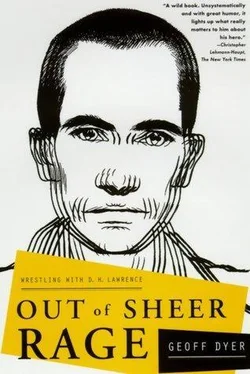This saying ‘yes’ — like Larkin’s saying ‘no’ — is heard most clearly in Lawrence’s letters. It is audible in the novels, too, of course, but it becomes more pronounced, more exposed, as we descend the traditional hierarchy of genre. In the novels the meeting between Lawrence and the world is mediated, inevitably, by Gudrun and Ursula, by the authorial representatives, by the demands of novelisation. Always, in the major works, the primary meeting is between Lawrence and the novel form which he is trying to mould, to recast in his own needs. What we want now, ‘all these donkeys years’ later, is Lawrence in the midst of his sensations. ‘Whoever reads me will be in the thick of the scrimmage,’ he wrote in January 1925, ‘and if he doesn’t like it — if he wants a safe seat in the audience — let him read somebody else.’ In the novels we are in the scrimmage of art which, however apparently artless, will always be less of a scrimmage than the life unfolding in the letters. It is there, in the letters, that the scrimmage — the essence of Lawrence’s art — is most nakedly revealed. Nor does it matter, in Lawrence’s case as it does with some writers, if the prose of the letters is less honed, more error-prone, than in his published writing. Lawrence was, in some ways, a relatively careless writer, indifferent, or so he claimed, to the appearance of his words on the page. ‘What do I care if “e” is somewhere upside down, or “g” comes from the wrong fount? I really don’t.’ Needless to say, this easy-going attitude to matters typographical did not stop him lambasting publishers for failing to pick up on exactly these kind of mitsakes: without this capacity for energetic self-contradiction there would be no scrimmage.
It is for this reason, I think, not simply because of his fame, that Lawrence’s manuscripts became so sought after. His writing urges us back to its source, to the experience in which it originates. Ideally — and I am here trying to suggest the direction of an urge not necessarily an actual wish — we would have met Lawrence (in a way that even his admirers, surely, have no desire to have met E. M. Forster). Failing that we want the experience of reading him to be as intimate as possible; for the collector — I imagine — this means unmediated even by typesetting. Frieda had as sharp a sense of the possible commercial value of the Lady Chatterley manuscripts as anyone but she also understood and expressed perfectly the special poignancy of this intimacy: ‘I enjoy looking at them,’ she said, ‘and reading them in the raw as it were.’
Some of Lawrence’s books would have benefited from thorough, careful revision but what was essential about Lawrence — the qualities that made his writing identifiably Lawrentian — is always present at a draft stage. The improvements that come from redrafting are of relatively minor importance compared to the shock of his first encounter with the subject or incident he is addressing. In the elegy written shortly after his death Rebecca West explained how she felt unable to make the point that she wanted about Lawrence’s work without recourse to her personal acquaintance with him (note again that familiar motion, from the work, back to the source, from the work to the man who made it). She met him, briefly, in Florence in the company of Norman Douglas who explained that it was Lawrence’s habit to arrive in a place and immediately, before he was in any position to do so, to start banging out an article about it. Douglas and West knocked on the door of Lawrence’s hotel room and there he was, fresh off the train, ‘tapping out an article on the state of Florence at that moment without knowing enough about it to make his views of real value’. Later she realised that ‘he was writing about the state of his own soul at that moment, which. . he could render only in symbolic terms; and the city of Florence was as good a symbol as any other.’ 2
‘I feel there is a curious grudge, or resentment against everything,’ Lawrence observed, grudgingly, on arriving in New Mexico, ‘almost in the very soil itself.’
Seven years earlier, in the autumn of 1915, Lawrence made a number of visits to Garsington Manor, the home of Ottoline Morrell. On 9 November, the day after his arrival, he wrote the first of several visionary accounts of his experiences there:
When I drive across this country, with the autumn falling and rustling to pieces, I am so sad, for my country, for this great wave of civilisation, 2000 years, which is now collapsing, that it is hard to live. So much beauty and pathos of old things passing away and no new things coming: this house of the Ottolines — It is England — my God, it breaks my soul — this England, these shafted windows, the elm trees, the blue distance — the past, the great past, crumbling down, breaking down, not under the force of the coming buds but under the weight of many exhausted, lovely yellow leaves, that drift over the lawn and over the pond, like the soldiers, passing away, into winter and the darkness of winter — no, I can’t bear it. For the winter stretches ahead, where all vision is lost and all memory dies out. . I can’t bear it: the past, the past, the falling, perishing crumbling past so great, so magnificent.
As soon as he returned to London he wrote to tell Ottoline how that visit would ‘always be a sort of last vision of England to me, the beauty of England, the wonder of this terrible autumn: when we set the irises above the pond, in the stillness and the wetness’. By the end of the month he was back at Garsington again and from there he wrote another, related letter to his hostess:
So vivid a vision, everything so visually poignant, it is like that concentrated moment when a drowning man sees all his past crystallised into one jewel of recollection.
The slow, reluctant, pallid morning, unwillingly releasing its tarnished embellishment of gold, far off there, outside, beyond the shafted windows, beyond, over the forgotten, unseen country, that lies sunken in gloom below, whilst the dawn sluggishly bestirs itself, far off, beyond the window-shafts of stone, dark pillars, like bars, dark and unfathomed, set near me, before the reluctance of the far-off dawn:
the window-shafts, like pillars, like bars, the shallow Tudor arch looping over between them, looping the darkness in a pure edge, in front of the far-off reluctance of the dawn:
Shafted, looped windows between the without and the within, the old house, the perfect old intervention of fitted stone, fitted perfectly about a silent soul, the soul that in drowning under this last wave of time looks out clear through the shafted windows to see the dawn of all dawns taking place, the England of all recollection rousing into being:
the wet lawn drizzled with brown sodden leaves; the feathery heap of the ilex tree; the garden-seat all wet and reminiscent:
between the ilex tree and the bare, purplish elms, a gleaming segment of all England, the dark plough-land and wan grass, and the blue, hazy heap of the distance, under the accomplished morning.
So the day has taken place, all the visionary business of the day. The young cattle stand in the straw of the stack yard, the sun gleams on their white fleece, the eye of Io, and the man with side-whiskers carries more yellow straw into the compound. The sun comes in all down one side, and above, in the sky, all the gables and the grey stone chimney-stacks are floating in pure dreams.
There is threshed wheat smouldering in the great barn, the fire of life; and the sound of the threshing machine, running, drumming. .
It is an extraordinary letter, an extraordinary vision — or series of visions — of England: a synthesis in prose of Blake, Constable and Turner. Part of Lawrence’s intention was to show his aristocratic friend how full of writing he was but there is also a sense of the words welling up in him unbidden. Each paragraph pulses into life from the seed of the preceding one; each paragraph offers an amended version of the same material; each version enters more deeply into the experience and, at the same time, advances it incrementally. It is like hearing alternate takes of a piece of music but, as these different versions unfold, so a narrative emerges: the narrative of his attempts to fix an experience that is vast, shifting, apocalyptic.
Читать дальше












